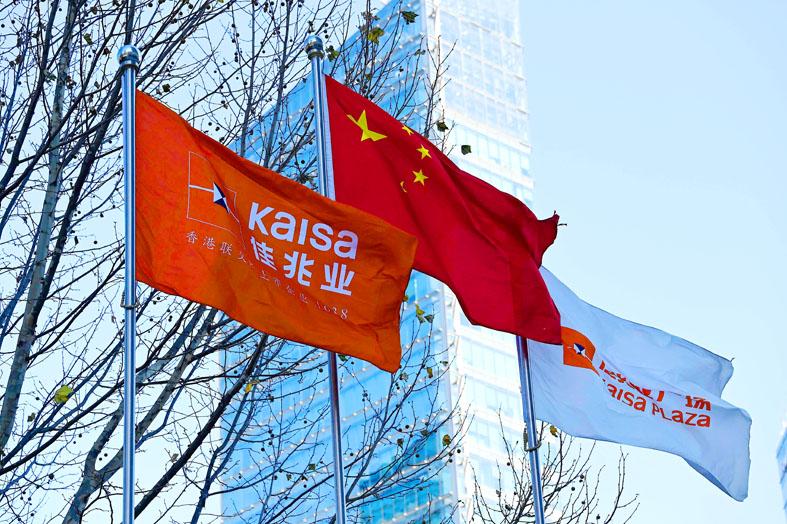Chinese property developer Kaisa Group Holdings Ltd (佳兆業集團) yesterday said it failed to secure the minimum 95 percent approval it needed from offshore bondholders to extend the maturity of a US$400 million note due next week, raising the risk of a default.
With the Chinese property sector gripped by an unprecedented liquidity squeeze, Kaisa now faces the possibility of defaulting on its 6.5 percent offshore bonds due on Tuesday and drawing renewed focus on other developers also staring at a wall of offshore debt maturing over the next few months.
Kaisa had hoped to exchange the US$400 million 6.5 percent offshore bonds for new notes due June 6, 2023, at the same interest rate if at least 95 percent of holders accepted. It did not disclose how many bondholders had consented to the offer.

Photo: AFP
STOCK PLUNGE
Shares of the embattled property firm dropped 9.8 percent in intraday trading to a record low of HKUS$0.92, taking the stock’s plunge so far this year to about 75 percent.
The firm, which became the first Chinese property developer to default on its dollar bonds in 2015, said it had been in talks with representatives of certain bondholders, but no “legally binding agreement” had been entered into yet.
“To ease the current liquidity issue and reach an optimal solution for all stakeholders, the company is assessing and is closely monitoring the financial condition and cash position of the group,” it said yesterday.
It added that it was still exploring selling assets and extending or renewing debt obligations, but cautioned there was no guarantee it would be able to meet the maturity date.
A failure to repay or reach an agreement with creditors would have “a material adverse effect” on Kaisa’s financial condition, it said.
Kaisa is the second-largest dollar bond issuer among China’s property developers after China Evergrande Group (恆大集團), which has more than US$300 billion in liabilities, and like the others has been scrambling to raise capital to stave off a default.
Reuters reported last month that the firm was looking to sell its Hong Kong-listed property management unit, Kaisa Prosperity Holdings Ltd.
Last week, in its notes exchange offer, Kaisa Group said it could consider a debt restructuring exercise if bondholders did not approve the extension of maturity.
Its failure in getting a much-needed lifeline from its creditors would also weigh on other smaller developers that are looking to avoid long and messy litigation and restructuring processes, analysts have said.
EVERGRANDE
Also on the horizon is the end of a 30-day grace period for Evergrande, which has been narrowly avoiding defaults, after it failed to pay coupons totalling US$82.5 million due on Nov. 6.

South Korea’s equity benchmark yesterday crossed a new milestone just a month after surpassing the once-unthinkable 5,000 mark as surging global memory demand powers the country’s biggest chipmakers. The KOSPI advanced as much as 2.6 percent to a record 6,123, with Samsung Electronics Co and SK Hynix Inc each gaining more than 2 percent. With the benchmark now up 45 percent this year, South Korea’s stock market capitalization has also moved past France’s, following last month’s overtaking of Germany’s. Long overlooked by foreign funds, despite being undervalued, South Korean stocks have now emerged as clear winners in the global market. The so-called “artificial intelligence

‘SEISMIC SHIFT’: The researcher forecast there would be about 1.1 billion mobile shipments this year, down from 1.26 billion the prior year and erasing years of gains The global smartphone market is expected to contract 12.9 percent this year due to the unprecedented memorychip shortage, marking “a crisis like no other,” researcher International Data Corp (IDC) said. The new forecast, a dramatic revision down from earlier estimates, gives the latest accounting of the ongoing memory crunch that is affecting every corner of the electronics industry. The demand for advanced memory to power artificial intelligence (AI) tasks has drained global supply until well into next year and jeopardizes the business model of many smartphone makers. IDC forecast about 1.1 billion mobile shipments this year, down from 1.26 billion the prior

People stand in a Pokemon store in Tokyo on Thursday. One of the world highest-grossing franchises is celebrated its 30th anniversary yesterday.

Chinese artificial intelligence (AI) start-up DeepSeek’s (深度求索) latest AI model, set to be released as soon as next week, was trained on Nvidia Corp’s most advanced AI chip, the Blackwell, a senior official of US President Donald Trump’s administration said on Monday, in what could represent a violation of US export controls. The US believes DeepSeek will remove the technical indicators that might reveal its use of American AI chips, the official said, adding that the Blackwells are likely clustered at its data center in Inner Mongolia, an autonomous region of China. The person declined to say how the US government received